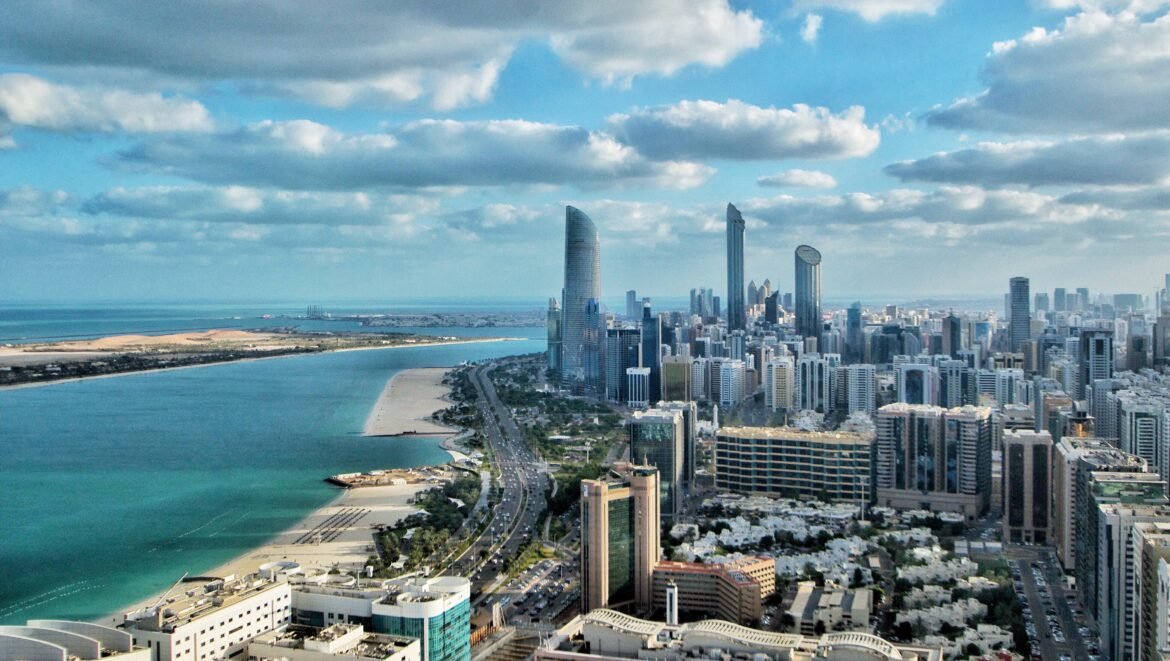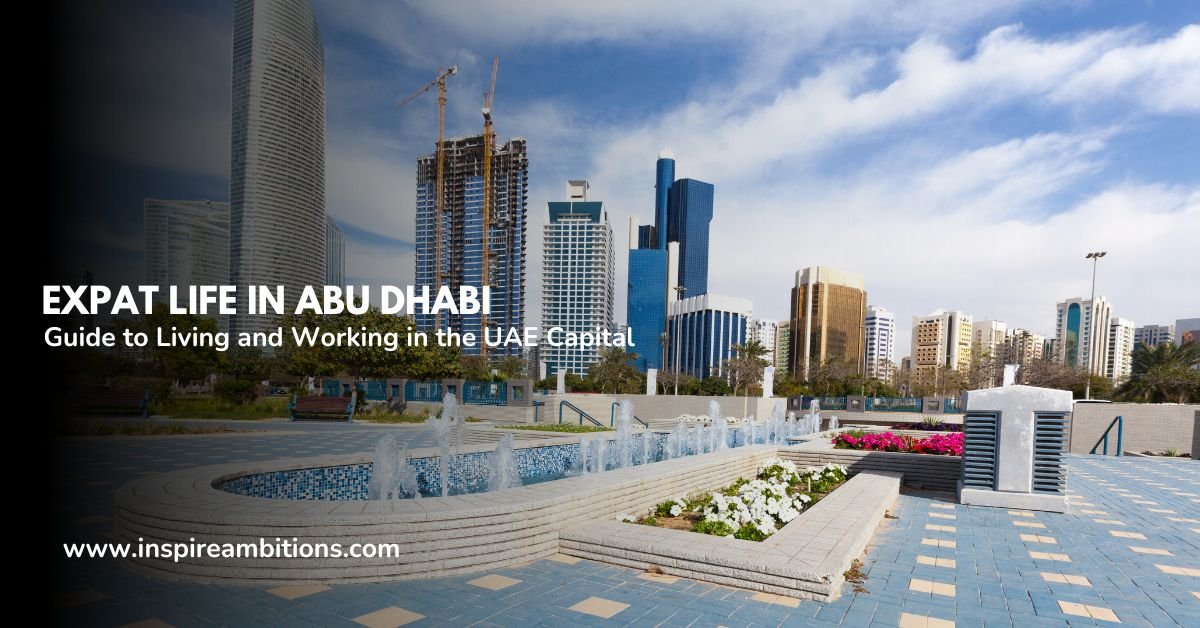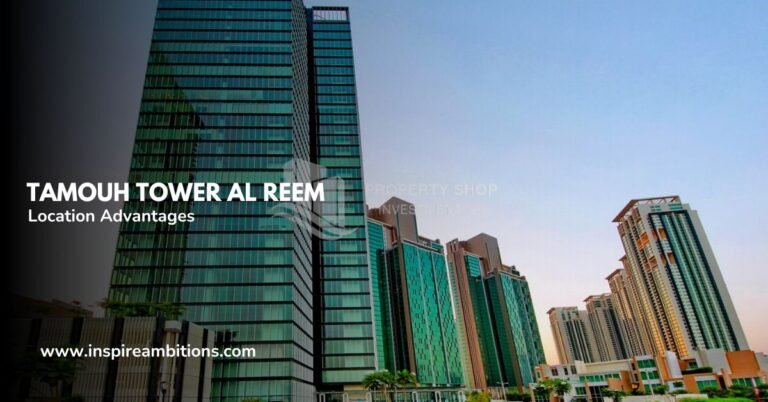Expat Life in Abu Dhabi – A Comprehensive Guide to Living and Working in the UAE Capital
Abu Dhabi, the gleaming capital of the United Arab Emirates, offers a vibrant tapestry of experiences for expatriates looking to weave the fabric of their lives in new and exciting ways. Luxurious, diverse, and culturally steeped, it uniquely blends modernity and tradition.
Life in Abu Dhabi for expats is an eclectic mix of high-octane living and serene escapades, with safety, healthcare, and educational facilities ranking among the best in the world.
Whether you’re navigating the bustle of city life, settling into cosy island communities, or fostering relationships in this cultural melting pot, Abu Dhabi beckons with a promise of a quality lifestyle.

Setting up a home under the illustrious skyline, you’ll find various accommodation options tailored to various budgets and preferences, especially in neighbourhoods like Al Reem Island. The professional scene is equally promising, teeming with opportunities across multiple sectors, tempting those keen to elevate their career on an international stage.
Families moving here are welcomed by a supportive expat community, providing a warm environment for children to thrive in top-notch international schools. Despite the cosmopolitan vibe, embracing the local customs and traditions is essential, as they are integral to the emirate’s identity and everyday life.
Expat Life in Abu Dhabi – Key Takeaways
- Abu Dhabi offers a blend of luxury living, cultural heritage, and top-tier facilities catering to expats.
- There’s a diverse selection of housing, excellent education options, and a robust job market.
- Understanding local customs and community engagement is critical to a fulfilling expat experience in Abu Dhabi.
7 Key Insights for Embracing Expat Life in Abu Dhabi
“East meets West in Abu Dhabi,” they say, and for expats, understanding the nuances of this vibrant emirate can be the key to a fulfilling experience. As you navigate life in this dynamic part of the UAE, it’s crucial to grasp the core aspects of cultural practices, language nuances, and climatic patterns unique to Abu Dhabi.
Cultural Insights and Social Customs
Abu Dhabi is a tapestry of Islamic tradition and modern innovation, where social customs are deeply rooted in religion and tradition. It’s essential to dress modestly in public and understand Islamic practices such as the daily prayers and the significance of Ramadan. The people of Abu Dhabi are known for their hospitality, and as an expat, you’ll often find yourself welcomed with open arms.
Languages and Communication
While Arabic is the official language, the presence of numerous nationalities has established English as a widely-spoken lingua franca. As an expat, you’ll find that learning a few basic Arabic phrases will help you in everyday interactions and show respect for the local culture.
Climate and Weather Patterns
The climate in Abu Dhabi is characterized by year-round sunshine, making it a haven for sun-seekers. Be prepared for the hot and humid summer months when temperatures soar. Rain is scarce, but it can be quite refreshing when it does rain. Remaining hydrated and investing in good air conditioning is essential for a comfortable stay.
Remember these insights as you embark on your new adventure in Abu Dhabi. Embrace the culture, learn the language, and adjust to the climate to make the most of your life in this fascinating emirate.

Living in Abu Dhabi: Lifestyle and Housing
When considering a move to Abu Dhabi, knowing the ins and outs of where you’ll live and play is crucial. This guide zeroes in on the local life, from the vibrant residential communities to the dynamic leisure options that await.
Residential Communities and Real Estate
Abu Dhabi offers luxurious and practical living spaces catering to diverse preferences. Al Reem Island is known for its modern apartments with stunning views, while Yas Island boasts a lively atmosphere near theme parks and the F1 circuit.
Saadiyat Island is an evolving cultural hub with upscale villas, and Al Reef delivers a family-friendly environment with comfortable townhouses. You’ll find a mix of high-rise apartments and spacious villas. Raha Beach combines the best of waterfront living and access to retail outlets.
Cost of Living and Expenses
The cost of living in Abu Dhabi can depend on lifestyle choices, but housing will constitute a significant part of the budget. Rental prices fluctuate: Apartments on Al Reem Island might start from AED 70,000 for a one-bedroom, with prices ascending for larger spaces or luxury amenities. Setting aside funds for utilities, transportation, and recreational activities is also important; however, Abu Dhabi is tax-free, which can balance total living expenses.
Leisure and Recreation
Days off in Abu Dhabi can be spent enjoying ample leisure and recreation activities. The Corniche provides a picturesque beachfront for walks, while numerous parks dot the city, offering relaxing green spaces. For beach enthusiasts, the pristine shores on Saadiyat Island are a haven.
The capital also prides itself on family-friendly destinations such as public playgrounds and amusement parks on Yas Island, elevating the recreational lifestyle for singles and families alike.
Working in Abu Dhabi: Opportunities and Considerations
When considering working in Abu Dhabi, you must understand the job market, the business culture, and the financial implications. This guide is tailored to equip you with invaluable insights into securing work and thriving financially in the emirate.
Job Market and Employment
As a robust economic centre, Abu Dhabi offers vast work opportunities for expatriates across its diversified sectors. The oil and gas industry continues to be a significant employer, but there are also growing sectors such as:
- Hospitality and service (trade, restaurants, hotels)
- Communication and finance
- Real estate and business services
Remember that the job market can be competitive, and having relevant qualifications and experience in your sector will enhance your employment prospects.
Business Culture and Etiquette
Understanding the business culture is crucial when you’re working in an international context. In Abu Dhabi, the work culture is rooted in respect and the local traditions of the UAE. Key points include:
- Formal business attire is usually expected.
- Personal relationships and trust are vital in business dealings.
- Decision-making can be hierarchical, with senior management often making the final calls.
Embracing these cultural nuances will be imperative to your professional success in Abu Dhabi.
Financial Benefits and Taxation
One of the most attractive aspects of working in Abu Dhabi is the tax-free income, meaning the local government does not tax your earnings. However, this does not necessarily mean you’re exempt from taxation in your home country—check your local tax obligations. Additional financial considerations include:
- The cost of living can be high—plan your finances accordingly.
- Value-added tax (VAT) is 5% on most goods and services.
By understanding these financial details, you can better manage your finances and enjoy the benefits of working in Abu Dhabi.
Family and Education: Schools and Community Life
For expats moving to Abu Dhabi, understanding family dynamics and the educational landscape is vital. This guide provides an insider’s look into schools and community life tailored to meet children’s educational needs and family well-being.
Educational System and Schools
Abu Dhabi has a broad educational option catering to its diverse expat community. International schools are prevalent, offering curricula from the British, American, and International Baccalaureate (IB) systems. Children can enjoy continuity in their education, akin to what they experienced in their home countries. For example, the Globetrotters guide emphasizes the growth and adaptability of expat children in local educational settings.
- British schools: A-Levels and GCSEs,
- American schools: AP courses and a US diploma,
- IB schools: PYP, MYP, and the IB Diploma.
It’s advisable to initiate the enrollment process early due to high demand. Facilities are modern, with playgrounds and amenities encouraging a rounded education, including sports and arts.
Family Support and Facilities
Community is at the centre of Abu Dhabi’s appeal for families. Expat families find a support network ranging from parenting groups to recreational and cultural activities that boost inter-family ties and foster friendships among children.
- For families with children, key considerations include accessibility to playgrounds and family-friendly community centres.
- Facilities supporting family health and well-being are widely available, including parks, public spaces, and medical facilities.
Parenting in a new environment can be challenging, but the robust support system in Abu Dhabi makes the transition smoother. Expat Arrivals hails the Emirates’ focus on creating an inclusive atmosphere for expat families.
Healthcare and Safety in Abu Dhabi
In Abu Dhabi, healthcare quality is high, and safety measures are well-regarded. As an expat, understanding the medical services access and insurance implications is crucial.
Access to Medical Services
Abu Dhabi provides a comprehensive healthcare system, with public and private facilities offering state-of-the-art medical services. In case of urgent medical attention, emergency healthcare is free of charge at public hospitals, a relief for citizens, residents, and visitors alike. The improvements in the healthcare system over recent years ensure quality care is accessible.
Health Insurance and Costs
Health insurance is mandatory in Abu Dhabi, with the costs typically shared between employers and employees. Coverage varies, but it often includes both inpatient and outpatient services. The cost of healthcare in Abu Dhabi per person indicates the significant investment made in the sector. It’s essential to understand your health coverage to manage potential expenses effectively.
Regarding safety, Abu Dhabi has a robust system for public health issues, including COVID-19. Measures are constantly updated to ensure the well-being of all residents and visitors.
Expat Life in Abu Dhabi: A Comprehensive Guide
“Home is where the heart is,” they say, and for many expats, Abu Dhabi has become just that. This guide aims to show you the vibrant life that awaits in this bustling metropolis, specifically through the lenses of leisure and socializing.
Leisure and Socializing: Events and Entertainment
In Abu Dhabi, leisure and the art of socializing are central to the expatriate experience, offering a variety of shopping venues, dining options, cultural events, and festivities that cater to all ages and interests.
Shopping and Dining Out
Abu Dhabi’s retail landscape presents an impressive array of shopping malls that are more than places to shop; they are centres for socializing and entertainment. Reputed malls like The Galleria, Marina Mall, and Yas Mall offer a luxurious shopping experience with their wide selection of international brands alongside a mix of indoor entertainment options.
Dining out in Abu Dhabi is an event with many restaurants ranging from casual eateries to high-end dining experiences. Hotels in the city, like Emirates Palace and The St. Regis Abu Dhabi, house some of the finest restaurants, offering cuisines from around the world. During Ramadan, the iftar and suhoor meals become significant social events, and hotels citywide offer sumptuous spreads.
Cultural Events and Festivities
In Abu Dhabi, cultural events and festivities are pivotal in social life. The annual Abu Dhabi Festival brings a fusion of arts and culture to the city with world-class performances and exhibitions. Festivals and events in Abu Dhabi, such as the Abu Dhabi Science Festival and National Day Celebrations, offer fun-packed events for individuals and families alike.
The religious and social fabric of the city is enriched by festivities like Eid, where mosques such as the iconic Sheikh Zayed Grand Mosque stand at the forefront of the celebrations. Several hotels and clubs host Christmas events for those missing the Yuletide spirit, ensuring that expats can celebrate with the local community.
Whether nurturing friendships at a club, engaging in family fun at a hotel event, or soaking up the culture at a festival, Abu Dhabi’s landscape of leisure and socializing ensures your calendar can be as vibrant and colourful as the city itself.







